Merz wants to check funding: More transparency for municipalities!
Merz wants to check funding: More transparency for municipalities!
In a significant address at the local congress of the German Association of Cities and Municipalities in Berlin, Chancellor Friedrich Merz has announced that it can critically review funding in the social and local area. He explains that the annual increase rates of up to ten percent in youth welfare and integration assistance are no longer acceptable. Merz emphasizes the need to find ways that take into account both the needy and the performance of public budgets.
A central concern of the Chancellor is to ensure that the funding for less bureaucracy is assigned. This decision should be made better on site in order to create a recognizable added value for the citizens through sensible investments. Merz announced that intensive advice is imminent, also and especially with regard to the coalition partner SPD.
sustainability for people with disabilities
The context of the discussion about the promotion of social projects is shaped by the federal government's law (BTHG), which will come into force in four reform levels by 2023. The aim of this legislative package is to improve participation and self -determination for people with disabilities. People who receive integration aid can keep more of their income and assets, which is an enormous relief for municipalities and countries, since basic security and integration aids are partially adopted by the federal government.
The BTHG obliges rehabilitation carriers to recognize early disabilities and to take preventive measures. At the same time, the federal program "Innovative Ways to Participate in Working Life - Rehabro" has been promoting an innovation approach to rehabilitation since 2018. Around 1 billion euros are available for this by 2026.
social participation and rights
It is important to recognize that disability becomes a living situation and social risk in modern society, which has resulted in various reactions in social policy. People with impairments are often excluded from central institutions such as school, work and living. In order to counteract this exclusion, special institutions were created that aim to get support offers for people with disabilities from general poor care.
A fundamental part of social participation is the legal regulation that anchoring a ban on disadvantage due to disability since 1994 in the Basic Law. In addition, the UN Convention on the Rights of the Rights of Disabilities and other social policy measures led to improved participation in working life, education and more social integration. Over 8 million people are recognized as severely disabled in Germany, and support for their social participation should increasingly enable self -determined life in the community.
The challenge remains that the quality of the offers of help is continuously checked so that the interests and rights of people with disabilities are preserved. The upcoming consultations and the measures that were outlined by Merz during his announcement could be decisive in order to make progress in the support of needy people.
For more information about the goals of the federal government network, you can visit bmas.de Further details on the situation of people with disabilities in social policy can be found on DetailsOrt Berlin, Deutschland Quellen


Kommentare (0)